Kirksville (660) 665-9000
May 2023
Why Do I Have Foot Pain?
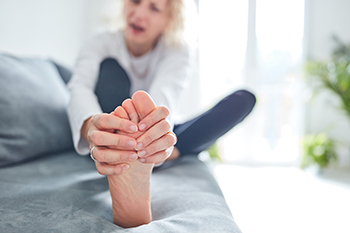
The muscles in the feet can become overworked. This may result in foot pain, and it can happen from repetitive body movement. Foot pain may also occur from wearing shoes that do not fit correctly or standing on hard or uneven surfaces for most of the day. People who are overweight may also experience foot pain from the extra weight the feet must endure. Additionally, existing foot conditions such as flat feet, bunions, or hammertoe may cause foot pain, and many patients seek relief from a podiatrist. It is beneficial to wear shoes that are made with quality materials, in addition to having good arch support and shock absorbers. Many people enjoy having regular foot massages performed to help reduce aches and foot pain. If you have foot pain for any reason, it is strongly suggested you are under the care of a podiatrist who can diagnose the cause and offer treatment solutions that are right for you.
Foot Pain
Foot pain can be extremely painful and debilitating. If you have a foot pain, consult with Deborah Holte, DPM from Northeast Missouri Foot Clinic. Our doctor will assess your condition and provide you with quality foot and ankle treatment.
Causes
Foot pain is a very broad condition that could be caused by one or more ailments. The most common include:
- Bunions
- Hammertoes
- Plantar Fasciitis
- Bone Spurs
- Corns
- Tarsal Tunnel Syndrome
- Ingrown Toenails
- Arthritis (such as Gout, Rheumatoid, and Osteoarthritis)
- Flat Feet
- Injury (from stress fractures, broken toe, foot, ankle, Achilles tendon ruptures, and sprains)
- And more
Diagnosis
To figure out the cause of foot pain, podiatrists utilize several different methods. This can range from simple visual inspections and sensation tests to X-rays and MRI scans. Prior medical history, family medical history, and any recent physical traumatic events will all be taken into consideration for a proper diagnosis.
Treatment
Treatment depends upon the cause of the foot pain. Whether it is resting, staying off the foot, or having surgery; podiatrists have a number of treatment options available for foot pain.
If you have any questions, please feel free to contact our office located in Kirksville, MO . We offer the newest diagnostic and treatment technologies for all your foot care needs.
Achilles Tendon Rupture Test
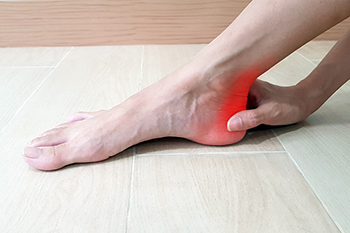
There are many different types of Achilles tendon injuries. For example, a common type of Achilles tendon injury is known as an Achilles tendon rupture. This condition can occur when the tendon above the heel is disrupted partially or entirely. A medical professional can perform specific tests that can determine whether or not an individual has an Achilles tendon rupture. Namely, the Matles test advises that if a patient cannot easily stand on their tiptoes, it may indicate an Achilles tendon rupture. Additionally, the Simmonds–Thompson test can be performed when a medical professional squeezes the calf muscle. If there is no downward motion in the foot, this may also indicate an Achilles tendon rupture has occurred. If you are someone that thinks they may be living with an Achilles tendon injury, it is suggested that you schedule an appointment with a podiatrist today.
Achilles tendon injuries need immediate attention to avoid future complications. If you have any concerns, contact Deborah Holte, DPM of Northeast Missouri Foot Clinic. Our doctor can provide the care you need to keep you pain-free and on your feet.
What Is the Achilles Tendon?
The Achilles tendon is a tendon that connects the lower leg muscles and calf to the heel of the foot. It is the strongest tendon in the human body and is essential for making movement possible. Because this tendon is such an integral part of the body, any injuries to it can create immense difficulties and should immediately be presented to a doctor.
What Are the Symptoms of an Achilles Tendon Injury?
There are various types of injuries that can affect the Achilles tendon. The two most common injuries are Achilles tendinitis and ruptures of the tendon.
Achilles Tendinitis Symptoms
- Inflammation
- Dull to severe pain
- Increased blood flow to the tendon
- Thickening of the tendon
Rupture Symptoms
- Extreme pain and swelling in the foot
- Total immobility
Treatment and Prevention
Achilles tendon injuries are diagnosed by a thorough physical evaluation, which can include an MRI. Treatment involves rest, physical therapy, and in some cases, surgery. However, various preventative measures can be taken to avoid these injuries, such as:
- Thorough stretching of the tendon before and after exercise
- Strengthening exercises like calf raises, squats, leg curls, leg extensions, leg raises, lunges, and leg presses
If you have any questions please feel free to contact our office located in Kirksville, MO . We offer the newest diagnostic tools and technology to treat your foot and ankle needs.
Causes of Swollen Ankles
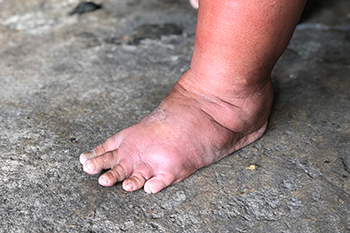
Swelling in the ankles, also known as edema, is not uncommon and has many causes. A sprained ankle is one of the most common causes of a swollen ankle, as are sitting for prolonged periods, airplane travel, pregnancy, and obesity. Certain medications may contribute to swelling in the ankles. Among them are medication for blood pressure, anti-inflammatory drugs, and anti-allergy remedies. Certain hormonal therapy drugs and antidepressants may also generate swelling in the ankle. More seriously, swollen ankles can be caused by a number of underlying health conditions such as a blocked lymphatic system, arthritis, and blood clots. Preeclampsia, a common and potentially dangerous condition among pregnant women, can be indicated by a sudden swelling in the ankles. Congestive heart failure, as well as liver or kidney dysfunction, are other serious causes of swollen ankles. If you are unsure what is causing swelling in the ankles, it is suggested that you visit a podiatrist for a thorough exam.
Ankle pain can have many different causes and the pain may potentially be serious. If you have ankle pain, consult with Deborah Holte, DPM from Northeast Missouri Foot Clinic. Our doctor will assess your condition and provide you with quality foot and ankle treatment.
Ankle pain is any condition that causes pain in the ankle. Due to the fact that the ankle consists of tendons, muscles, bones, and ligaments, ankle pain can come from a number of different conditions.
Causes
The most common causes of ankle pain include:
- Types of arthritis (rheumatoid, osteoarthritis, and gout)
- Ankle sprains
- Broken ankles
- Achilles tendinitis
- Achilles tendon rupture
- Stress fractures
- Tarsal tunnel syndrome
- Plantar fasciitis
Symptoms
Symptoms of ankle injury vary based upon the condition. Pain may include general pain and discomfort, swelling, aching, redness, bruising, burning or stabbing sensations, and/or loss of sensation.
Diagnosis
Due to the wide variety of potential causes of ankle pain, podiatrists will utilize a number of different methods to properly diagnose ankle pain. This can include asking for personal and family medical histories and of any recent injuries. Further diagnosis may include sensation tests, a physical examination, and potentially x-rays or other imaging tests.
Treatment
Just as the range of causes varies widely, so do treatments. Some more common treatments are rest, ice packs, keeping pressure off the foot, orthotics and braces, medication for inflammation and pain, and surgery.
If you have any questions, please feel free to contact our office located in Kirksville, MO . We offer the newest diagnostic and treatment technologies for all your foot care needs.
Symptoms of an Ingrown Toenail
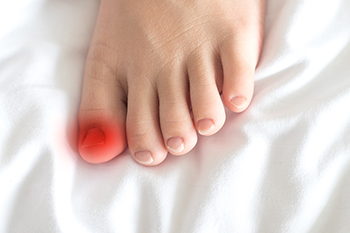
The pain that comes from having an ingrown toenail cannot be ignored. The medical term for this condition is referred to as onychocryptosis, and it generally affects the big toe. It happens when the nail grows into the skin instead of over it, and noticeable symptoms may be redness, soreness, and swelling. Effective prevention methods for an ingrown toenail can consist of wearing shoes that fit properly and trimming the toenails straight across instead of in a curved direction. An ingrown toenail also can happen if a toe injury has occurred, or if the shoes and socks that are worn are too tight. Patients may find temporary relief when the foot is soaked in warm water, and the nail is gently pulled away from the skin by using a small piece of cotton. Permanent relief can be found when a podiatrist is contacted, who can perform minor surgery, if necessary for removal of the nail. If you have developed an ingrown toenail, it is suggested that you contact this type of doctor who can determine what the best course of treatment is for you.
Ingrown toenails may initially present themselves as a minor discomfort, but they may progress into an infection in the skin without proper treatment. For more information about ingrown toenails, contact Deborah Holte, DPM of Northeast Missouri Foot Clinic. Our doctor can provide the care you need to keep you pain-free and on your feet.
Ingrown Toenails
Ingrown toenails are caused when the corner or side of a toenail grows into the soft flesh surrounding it. They often result in redness, swelling, pain, and in some cases, infection. This condition typically affects the big toe and may recur if it is not treated properly.
Causes
- Improper toenail trimming
- Genetics
- Improper shoe fitting
- Injury from pedicures or nail picking
- Abnormal gait
- Poor hygiene
You are more likely to develop an ingrown toenail if you are obese, have diabetes, arthritis, or have any fungal infection in your nails. Additionally, people who have foot or toe deformities are at a higher risk of developing an ingrown toenail.
Symptoms
Some symptoms of ingrown toenails are redness, swelling, and pain. In rare cases, there may be a yellowish drainage coming from the nail.
Treatment
Ignoring an ingrown toenail can have serious complications. Infections of the nail border can progress to a deeper soft-tissue infection, which can then turn into a bone infection. You should always speak with your podiatrist if you suspect you have an ingrown toenail, especially if you have diabetes or poor circulation.
If you have any questions, please feel free to contact our office located in Kirksville, MO . We offer the newest diagnostic and treatment technologies for all your foot care needs.
Wounds That Don't Heal Need to Be Checked
Wearing High Heels May Be Detrimental to Foot Health
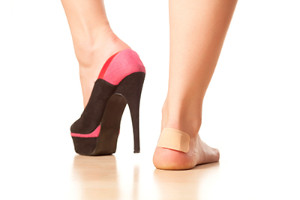
Many people endure the pain that can come from wearing high heels. This can be a result of the foot being forced into this type of shoe, and ending up in an unnatural position. This can cause the toes to push together as the heel extends up. Many women have discomfort from wearing high heels after approximately an hour, and may tend to ignore the pain. Wearing high heels can add sleekness to the leg, and the body can appear to be thinner and taller. Despite these favorable qualities, research has indicated that frequently wearing high heels may change the muscle balance surrounding the ankle joint, possibly leading to instability. High heels can push the center of gravity in the body up and forward, and changes to the posture may be needed to help maintain proper balance. If you would like additional information about the pros and cons of wearing high heels, it is suggested that you confer with a podiatrist who can help you in determining if wearing high heels is right for you.
High heels have a history of causing foot and ankle problems. If you have any concerns about your feet or ankles, contact Deborah Holte, DPM from Northeast Missouri Foot Clinic. Our doctor can provide the care you need to keep you pain-free and on your feet.
Effects of High Heels on the Feet
High heels are popular shoes among women because of their many styles and societal appeal. Despite this, high heels can still cause many health problems if worn too frequently.
Which Parts of My Body Will Be Affected by High Heels?
- Ankle Joints
- Achilles Tendon – May shorten and stiffen with prolonged wear
- Balls of the Feet
- Knees – Heels cause the knees to bend constantly, creating stress on them
- Back – They decrease the spine’s ability to absorb shock, which may lead to back pain. The vertebrae of the lower back may compress.
What Kinds of Foot Problems Can Develop from Wearing High Heels?
- Corns
- Calluses
- Hammertoe
- Bunions
- Morton’s Neuroma
- Plantar Fasciitis
How Can I Still Wear High Heels and Maintain Foot Health?
If you want to wear high heeled shoes, make sure that you are not wearing them every day, as this will help prevent long term physical problems. Try wearing thicker heels as opposed to stilettos to distribute weight more evenly across the feet. Always make sure you are wearing the proper shoes for the right occasion, such as sneakers for exercising. If you walk to work, try carrying your heels with you and changing into them once you arrive at work. Adding inserts to your heels can help cushion your feet and absorb shock. Full foot inserts or metatarsal pads are available.
If you have any questions please feel free to contact our office located in Kirksville, MO . We offer the newest diagnostic and treatment technologies for all your foot and ankle needs.





